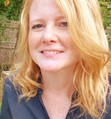Michelle Hauck's Blog, page 141
April 5, 2013
Lessons Learned the Hard Way: Jean Oram
All professions have a learning curve and writing is no exception. Yet in writing more than other professions, you're on your own. It's a solitary job after all, which means important aspects of the task sometimes get missed. These posts will be a chance for writers to mentor other writers through their confessions of lessons they learned. Lessons that might have been as painful as a pencil poke in the eye.
This post is a little bit different this week. Jean Oram, moderator from AQC, is here to share some of what she learned about being an author. The first part of her post is here on my blog. To read the rest of her post which applies more to her self-publishing journey, you'll have to go her blog. The link will be at the bottom. I read her book in less than two days. Fantastically written, the characters kept me guessing until the last moment. A very enjoyable read!

Last month I took the plunge and published one of my favourite manuscripts, Champagne and Lemon Drops, which had been soundly rejected by publishing house editors and literary agents. They liked it, but couldn't sell it. Chick lit was dead. (Although, apparently not if you give it away as a free ebook! Chick lit is still alive and well and still throbbing hearts within the indie circles.)
Michelle asked me to share a few of the lessons I've learned since my book’s launch. I had so many things pop to mind—many of which most authors don’t warn you about—that Michelle and I decided to break my list into two posts. This post, here on Michelle’s blog are all-round tips that can benefit both traditionally and independently (self-published) authors whereas the other half of the tips posted on my blog, The Helpful Writer, are must-read tips for indie authors (even though they can also help the traditional author). Both lists can benefit all authors and we encourage you to read them both.
Hold onto your hats! Here we go.
1. Edits will take at least twice as long as you think they will. And a part of you will always want to do another round—even though edits can be tiring and difficult. Start early on your edits. Always.
2. Pay it forward with other authors out of the goodness of your heart. Look for ways to help others without expectation and you will be stunned by how absolutely amazing and wonderful these people are when your book comes out. Warm and fuzzies!
3. Be kind. Always. Always. Always.
4. Make sure your website and social media profiles are up-to-date well ahead of time. At launch this is the last thing you want to stress about.
5. Have a prominent sign up link on your website’s homepage so readers who come check you out can sign up for new book updates. i.e. an author newsletter. This is a great way to stay connected to your readers so they don’t forget about you between books.
6. Join a posse of people who know what they're doing. Support systems rock and it is nice to have people who know the ins and outs of publishing and can help out, answer questions, chat, etc. Publishing can feel like a solitary endeavour, but it doesn't have to. You can also cross-promote and have fun while marketing and holding contests!
7. Visibility. The biggest thing that can go wrong with your book is obscurity. Books need readers. Get out there and get your book out there. There are tons of reading sites that are looking for new release books, books to review, etc. This can be time consuming, but this is why you have #6--your posse. Share your tips and resources with each other. Publishers can't do everything these days.
8. Read up on social media marketing and your form of publishing at least six months in advance. Practice and learn ahead of time while the stakes are low. You don't want to make a bunch of newbie mistakes and blunders and turn off readers or start freaking out because you don’t understand what you are doing right around book launch. (BTW, a great example of knowing the ropes would be learning about promotion on Facebook ahead of time so when you go to promote your book or a giveaway you don't end up in Facebook jail and with your account locked--it's happened to more authors than you may realize! All because they didn't do their research and made (reasonable) assumptions about what would be acceptable terms of use with using Facebook.)
9. Watch for book pirates! Eek and arrr!
10. Verbal blurb. People--in real life--are going to ask what your book is about. You have your written descriptions and likely a tagline, but in real life you need something simple that will start conversations AND roll off the tongue. It has to feel natural and be easy to remember. (As well as be intriguing.)
11. Write the next book. Always be writing the next book and let your readers know you are working on it. They love the feeling of knowing what an author is up to. It feels personal and they become invested in this new product before it is finished. Plus, more books equal more exposure, more readers, and more hooks out there in the world. It is also your best publicity. Me? I'm about 1/4 of the way through the first draft for book two of the Blueberry Springs series.
How about you? What lessons have you learned on the path to launching a book? (You can include things you’ve learned from watching others.) Let us know in the comment section.
P.S. Don't forget to read part 2 on The Helpful Writer.
[image error]
You can check out Jean's book, Champagne and Lemon Drops: A Blueberry Springs Chick Lit Contemporary Romance for free on Amazon.com, Kobo, Barnes and Noble, and Smashwords (with more vendors to come).
Champagne and Lemon Drops: A Blueberry Springs Chick Lit Contemporary RomanceOne woman. Two men. One meddling small town. Raised by her older sister in the small town of Blueberry Springs, all Beth Wilkinson wants is to create a family so big she’ll never be alone. Things are going great until her accountant fiancé, Oz, throws their life in the air, sending her on a journey of discovery paved with choices--including whether to return to her old life.
This post is a little bit different this week. Jean Oram, moderator from AQC, is here to share some of what she learned about being an author. The first part of her post is here on my blog. To read the rest of her post which applies more to her self-publishing journey, you'll have to go her blog. The link will be at the bottom. I read her book in less than two days. Fantastically written, the characters kept me guessing until the last moment. A very enjoyable read!

Last month I took the plunge and published one of my favourite manuscripts, Champagne and Lemon Drops, which had been soundly rejected by publishing house editors and literary agents. They liked it, but couldn't sell it. Chick lit was dead. (Although, apparently not if you give it away as a free ebook! Chick lit is still alive and well and still throbbing hearts within the indie circles.)
Michelle asked me to share a few of the lessons I've learned since my book’s launch. I had so many things pop to mind—many of which most authors don’t warn you about—that Michelle and I decided to break my list into two posts. This post, here on Michelle’s blog are all-round tips that can benefit both traditionally and independently (self-published) authors whereas the other half of the tips posted on my blog, The Helpful Writer, are must-read tips for indie authors (even though they can also help the traditional author). Both lists can benefit all authors and we encourage you to read them both.
Hold onto your hats! Here we go.
1. Edits will take at least twice as long as you think they will. And a part of you will always want to do another round—even though edits can be tiring and difficult. Start early on your edits. Always.
2. Pay it forward with other authors out of the goodness of your heart. Look for ways to help others without expectation and you will be stunned by how absolutely amazing and wonderful these people are when your book comes out. Warm and fuzzies!
3. Be kind. Always. Always. Always.
4. Make sure your website and social media profiles are up-to-date well ahead of time. At launch this is the last thing you want to stress about.
5. Have a prominent sign up link on your website’s homepage so readers who come check you out can sign up for new book updates. i.e. an author newsletter. This is a great way to stay connected to your readers so they don’t forget about you between books.
6. Join a posse of people who know what they're doing. Support systems rock and it is nice to have people who know the ins and outs of publishing and can help out, answer questions, chat, etc. Publishing can feel like a solitary endeavour, but it doesn't have to. You can also cross-promote and have fun while marketing and holding contests!
7. Visibility. The biggest thing that can go wrong with your book is obscurity. Books need readers. Get out there and get your book out there. There are tons of reading sites that are looking for new release books, books to review, etc. This can be time consuming, but this is why you have #6--your posse. Share your tips and resources with each other. Publishers can't do everything these days.
8. Read up on social media marketing and your form of publishing at least six months in advance. Practice and learn ahead of time while the stakes are low. You don't want to make a bunch of newbie mistakes and blunders and turn off readers or start freaking out because you don’t understand what you are doing right around book launch. (BTW, a great example of knowing the ropes would be learning about promotion on Facebook ahead of time so when you go to promote your book or a giveaway you don't end up in Facebook jail and with your account locked--it's happened to more authors than you may realize! All because they didn't do their research and made (reasonable) assumptions about what would be acceptable terms of use with using Facebook.)
9. Watch for book pirates! Eek and arrr!
10. Verbal blurb. People--in real life--are going to ask what your book is about. You have your written descriptions and likely a tagline, but in real life you need something simple that will start conversations AND roll off the tongue. It has to feel natural and be easy to remember. (As well as be intriguing.)
11. Write the next book. Always be writing the next book and let your readers know you are working on it. They love the feeling of knowing what an author is up to. It feels personal and they become invested in this new product before it is finished. Plus, more books equal more exposure, more readers, and more hooks out there in the world. It is also your best publicity. Me? I'm about 1/4 of the way through the first draft for book two of the Blueberry Springs series.
How about you? What lessons have you learned on the path to launching a book? (You can include things you’ve learned from watching others.) Let us know in the comment section.
P.S. Don't forget to read part 2 on The Helpful Writer.
[image error]
You can check out Jean's book, Champagne and Lemon Drops: A Blueberry Springs Chick Lit Contemporary Romance for free on Amazon.com, Kobo, Barnes and Noble, and Smashwords (with more vendors to come).
Champagne and Lemon Drops: A Blueberry Springs Chick Lit Contemporary RomanceOne woman. Two men. One meddling small town. Raised by her older sister in the small town of Blueberry Springs, all Beth Wilkinson wants is to create a family so big she’ll never be alone. Things are going great until her accountant fiancé, Oz, throws their life in the air, sending her on a journey of discovery paved with choices--including whether to return to her old life.
Published on April 05, 2013 05:58
April 1, 2013
Kindar's Cure Cover Reveal Contest!
 YAY!
YAY!The day is finally here! This is a contest so you guys can let me know which cover you like the best. And yes, there is a prize, but more on that later. Your vote and opinion matter. I want to hear if you think anything needs tweaked or if you have a clear favorite. Put your pick in the comments. The cover with the most votes wins!. I want to say a special thanks to Ken Tupper at Divertir Publishing for really taking my wishes into account and suggesting this contest. He went out of his way to include Kindar’s sword in the cover and made the image match the description, right down to the blue tint of the blade. After all, a princess is nothing without her sword.
Here is a blurb about the story to help with your decision:
Princess Kindar of Anost dreams of playing the hero and succeeding to her mother’s throne. But dreams are for fools. Reality involves two healthy sisters and a wasting disease of suffocating cough that’s killing her by inches. When her elder sister is murdered, the blame falls on Kindar, putting her head on the chopping block.
No one who survives eighteen years of choke lung lacks determination. A novice wizard, Maladonis Bin, approaches with a vision—a cure in a barren land of volcanic fumes. As choices go, a charming bootlicker that trips over his own feet isn’t the best option, but beggars can’t be choosers. Kindar escapes with Mal and several longtime attendants only to have her eyes opened that her country faces dark times.
Her mother’s decision to close the prosperous mines spurs poverty and joblessness, inciting rebellion and opening Anost to foreign invasion. As Mal urges her toward a cure that will prove his visions, suddenly, an ally turns traitor, delivering Kindar to a rebel army, who have their own plans for a sickly princess.
With the killer poised to strike again, the rebels bearing down, and the country falling apart, she must weigh her personal hunt for a cure against saving her people.
Originally, the cover contest was supposed to be a choice of three different cover pictures, but one picture just stood out above the rest. After looking at literally hundreds of photos, one image just fit my story. The model was Kindar and it also fit the mood I wanted to create. Though I gave Ken five possibilities, he insisted we go with the picture I really loved, giving a few adjustments to the basic design.
So here are the choices in both large and small size:
1. The original cover art without changes.

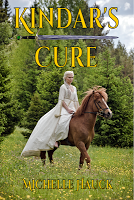
2. With Line Art outlining the picture to make the small version stand out more.
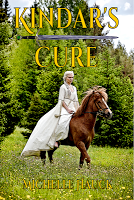

3. Green fringe to help the title stand out.
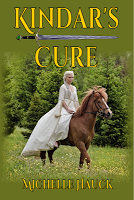

4. With white fringe for the same reason.
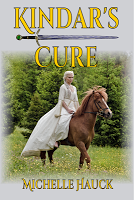

Now for the prize! I’ll mail an autographed copy of Kindar’s Cure to the winner. You must live in the US or Canada and leave a vote in the comments, plus your email address in the rafflecopter. The prize will arrive around May 1st or as soon as I get my hands on the first copies!
Good luck and thanks for stopping by!
a Rafflecopter giveaway
Published on April 01, 2013 10:20
March 29, 2013
Two Things
So I have a new look for my blog. The backgrounds gets boring after a while, and I like to switch them up. It's a lot easier than painting the walls, if you know what I mean. The last one was a very busy pattern so this time I went for simple and classy. Hope you like. It's sort of calming and blue is my favorite color. If you read any of my writing, you'll see my main characters usually wear blue.
 Hey, they didn't blow it up.
Hey, they didn't blow it up.
We went to see Olympus Has Fallen tonight. If you're a fan of the better Die Hard movies then I recommend you check this one out. Lots of action. Lots of blood. Lots of patriotic take-that bad guys. The main character ends up pretty messy which isn't such a bad thing. The bad guy is hate-able Sure, there were eye rolling moments where you say to yourself 'no way I'm buying that sh#$.' Overlook that and enjoy it anyway. After spending all day on twitter Pitch Madness I was ready to belief aside.
 Hey, they didn't blow it up.
Hey, they didn't blow it up.We went to see Olympus Has Fallen tonight. If you're a fan of the better Die Hard movies then I recommend you check this one out. Lots of action. Lots of blood. Lots of patriotic take-that bad guys. The main character ends up pretty messy which isn't such a bad thing. The bad guy is hate-able Sure, there were eye rolling moments where you say to yourself 'no way I'm buying that sh#$.' Overlook that and enjoy it anyway. After spending all day on twitter Pitch Madness I was ready to belief aside.
Published on March 29, 2013 19:40
March 27, 2013
Cover Reveal: Trisha Wooldridge
I'm so excited to help out a fellow member of Broad Universe. Happy Cover reveal week to Trisha Wooldridge and The Kelpie! Please check out some of her events.
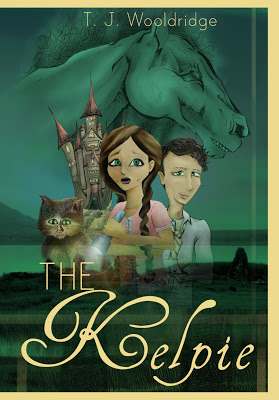
I can't honestly say I was joking when I suggested to my best friend, Joe – Prince Joseph, eldest son of England's Crown Prince – that we could probably find something the police had missed in regards to the missing children. After all, eleven and twelve year olds like us did that all the time on the telly and in the books we read… When Heather and Joe decide to be Sleuthy MacSleuths on the property abutting the castle Heather's family lives in, neither expect to discover the real reason children were going missing: A Kelpie. A child-eating faerie horse had moved into the loch "next door." The two barely escape with their lives, but they aren't safe. Caught in a storm of faerie power, Heather, Joe, and Heather's whole family are pulled into a maze of talking cats, ghostly secrets, and powerful magick. With another child taken, time is running out to make things right. To go along with sharing the simply gorgeous cover, author T.J. Wooldridge has enlisted several of her friends who have helped her in the journey of writing this novel to put together a special treat for you! Each day of the week, search for individual components of the cover--with a bonus piece of art on Wednesday--at these blogs. Collect the right words per the instructions, and unscramble the line of poetry to be entered to win one of three prizes! Prize 1A handmade fused glass kelpie necklace from Stained Glass Creations and Beyond Prize 2A handmade necklace from Art by Stefanie of Vic Caswell's rendering of the kelpie from the cover! Prize 3An 11x16 poster of the cover of the Kelpie signed by T. J. Wooldridge and artist Vic Caswell5x7 cards of all the cover aspects featured in the Scavenger Hunt So, how do you take part in the Scavenger Hunt? Here are the details:Collect the words from the novel excerpts and put together a poetic phrase. Monday 3/25 Visit the Faery Castle at Kate Kaynak's blog: http://thedisgruntledbear.blogspot.com/Scavenger Hunt Goal: first sentence, 10th word Tuesday 3/26 Hop over to Scotland at Stained Glass Creations and Beyond: http://stainedglasscreationsandbeyond.wordpress.com/Scavenger Hunt Goal: first sentence, 12th word Check out an artist rendition of Heather MacArthur's family tartan with Aimee Weinstein at tokyowriter.comScavenger Hunt Goal: first sentence, first word Wednesday 3/27 Bonus Art!Meet Heather's dad, Michael MacArthur, at Valerie Hadden's blog: http://valeriehadden.wordpress.com/Scavenger Hunt Goal: first sentence, 12th word Thursday 3/28 Cast your eyes upon the kelpie, itself, with Suzanne Reynolds-Alpert at http://suzannereynoldsalpert.blogspot.com/Scavenger Hunt Goal: 2nd sentence, 2nd word And feel the snark of Monkey, the fey cat with Justine Graykin at http://justinegraykin.wordpress.com/Scavenger Hunt Goal: first sentence, 3rd word Friday 3/29: Meet Heather's best friend, Prince Joseph at, who's hanging out with author Darby Karchut athttp://darbykarchut.blogspot.com/Scavenger Hunt Goal: first sentence, 17th word And finally meet Heather, herself, who's hanging out with one of Trisha's editors, Laura Ownbey athttp://redpenreviews.blogspot.com/Scavenger Hunt Goal: first sentence, first word Collect all the words and put them together in a poetic sentence, and enter them into the rafflecopter giveaway for a chance to win one of the three prizes: http://www.rafflecopter.com/rafl/share-code/MTBiNjRkMDYwN2U2MWZjNzBmNmM4YWEwNTEyODI0Ojc=/
Trisha J. Wooldridge"A Novel Friend" Writing & Editingwww.anovelfriend.com * novelfriend.blogspot.com
President, Broad Universe - www.broaduniverse.org
Editor, Spencer Hill Press - www.spencerhillpress.com
Published on March 27, 2013 12:55
March 26, 2013
Lessons Learned the Hard Way: Sean Jenan
This is a lesson that seems so simple and, yet, is so deep. It's in keeping with the writer. I've twisted the arm of the most mysterious and elusive of my writer friends (And maybe applied a little guilt. Sorry, I learned it from my mom.) to get this post. Actually I really want to thank Sean for taking the time when I know he is extremely busy at the moment.

Lessons Learned On a cold, dark morning in the winter of my forty-fourth year, I faced the realization that I had lost all faith in the absence of God.
I hadn’t found God exactly — but rather I thought of a question that I’d never had the words to ask before. I’d always understood the universe in a way that let it operate quite efficiently without the need for a divine creator, but it occurred to me in a moment of frightening lucidity: it didn’t then automatically follow that there wasn’t one. In trying to discover what was, I’d ignored the awesome playfulness of what could be.
Then the strangest thing happened. The spigot from which my stories had once flowed, stopped-up since the waning days of my youth, suddenly burst open. After a twenty-year hiatus, I wanted to write fiction again. I needed to. And with the benefit of two extra decades of knowledge, experience, and wrinkles, writing a new novel would be easier than the fitful thrashings of my teens and twenties. And it was! In a seven-month rush of pent-up ideas, I wrote nearly half a million words, which I rived in fifteen editing passes to the one hundred thousand that still remain as the completed manuscript for Cipher.
But the process was still too fractious and inefficient for me, filled with too much wandering and blind alleys. I was determined to make the next book more of a march than a fandango, perfect the technique of Writing The Novel. When I started sketching the plot for Black Sea, I resolved to use the lessons I learned writing Cipher as a springboard for crafting a tighter, denser work in less time. I set a goal of five months for completion, with the initial zero draft allocated forty days (corresponding to Lent).
The zero draft went as planned. Using my detailed outline as a guide, I made my 2500 word-per-day goals time and again, and even when I’d find a day swallowed by research, my output on the following day would easily keep me on track to finish. By Easter of 2012, I had 99,822 words on paper. I figured after a trip to the Easter vigil mass (to get Baptized, Confirmed and receive First Communion after having completed the year-long preparation program required to enter the Catholic Church), I’d have a quick three months of edits and be ready to query.
Yet this Lessons Learned is written a year later, during the last weeks of Lent in 2013, as I still edit and polish and make changes to Black Sea. I don’t know if it’s because this novel is much more challenging structurally than Cipher, if my evolving standards and expectations for my writing have outpaced my abilities, or if the distraction of querying and tinkering with Cipherrevisions concurrently is hindering me, but the net result is that my “five month novel” is likely to be a “fifteen month novel” — if I’m lucky.
Fifteen months was lucky for me in 1990. It had been that long since the birth of our first child when my wife told me she was pregnant with our second. I recall one of the eye-opening things about being a second-time parent: how surprised my wife and I were to discover that nearly every hard-won lesson we learned with our every-so-difficult firstborn son was barely useful with our new daughter. She didn’t merely arrive from the factory equipped with a different option package, she was at a right angle to everything we had learned to expect. We had to discover a new way to be the parents she needed us to be. Fortunately, thusly experienced with both types of child, we were well-prepared for our third. Until she arrived as a little human being somehow perpendicular to the axes occupied by her brother and sister. Suffice to say, three additional children later, we’re currently parenting in six-dimensional spacetime with the only common locus between our children’s personalities the zero-point origin centered on my wallet.
And it turns out novels are no different. Writing my fifth novel is as much a journey of discovery as was my first, three decades ago. The stories are alive, they’re unique, and — for me, at least — they can’t be stamped from a mold or contained by a process or predicted by a theory. They’ve got to find their own way, take a path as individual as the characters that populate them. That may mean a single forward motion or it may mean wandering in the desert for forty years. So being an author, like being a parent – like being a man – means valuing relationship more than result. Doing more listening than talking. Remaining open to serendipity, to foolishness, to moments of impossible absurd clarity. Following each path unafraid into the darkness — just to see where it leads.
And as it turns out, that’s a way to find yourself in a much more interesting place than you ever expected to visit.

Lessons Learned On a cold, dark morning in the winter of my forty-fourth year, I faced the realization that I had lost all faith in the absence of God.
I hadn’t found God exactly — but rather I thought of a question that I’d never had the words to ask before. I’d always understood the universe in a way that let it operate quite efficiently without the need for a divine creator, but it occurred to me in a moment of frightening lucidity: it didn’t then automatically follow that there wasn’t one. In trying to discover what was, I’d ignored the awesome playfulness of what could be.
Then the strangest thing happened. The spigot from which my stories had once flowed, stopped-up since the waning days of my youth, suddenly burst open. After a twenty-year hiatus, I wanted to write fiction again. I needed to. And with the benefit of two extra decades of knowledge, experience, and wrinkles, writing a new novel would be easier than the fitful thrashings of my teens and twenties. And it was! In a seven-month rush of pent-up ideas, I wrote nearly half a million words, which I rived in fifteen editing passes to the one hundred thousand that still remain as the completed manuscript for Cipher.
But the process was still too fractious and inefficient for me, filled with too much wandering and blind alleys. I was determined to make the next book more of a march than a fandango, perfect the technique of Writing The Novel. When I started sketching the plot for Black Sea, I resolved to use the lessons I learned writing Cipher as a springboard for crafting a tighter, denser work in less time. I set a goal of five months for completion, with the initial zero draft allocated forty days (corresponding to Lent).
The zero draft went as planned. Using my detailed outline as a guide, I made my 2500 word-per-day goals time and again, and even when I’d find a day swallowed by research, my output on the following day would easily keep me on track to finish. By Easter of 2012, I had 99,822 words on paper. I figured after a trip to the Easter vigil mass (to get Baptized, Confirmed and receive First Communion after having completed the year-long preparation program required to enter the Catholic Church), I’d have a quick three months of edits and be ready to query.
Yet this Lessons Learned is written a year later, during the last weeks of Lent in 2013, as I still edit and polish and make changes to Black Sea. I don’t know if it’s because this novel is much more challenging structurally than Cipher, if my evolving standards and expectations for my writing have outpaced my abilities, or if the distraction of querying and tinkering with Cipherrevisions concurrently is hindering me, but the net result is that my “five month novel” is likely to be a “fifteen month novel” — if I’m lucky.
Fifteen months was lucky for me in 1990. It had been that long since the birth of our first child when my wife told me she was pregnant with our second. I recall one of the eye-opening things about being a second-time parent: how surprised my wife and I were to discover that nearly every hard-won lesson we learned with our every-so-difficult firstborn son was barely useful with our new daughter. She didn’t merely arrive from the factory equipped with a different option package, she was at a right angle to everything we had learned to expect. We had to discover a new way to be the parents she needed us to be. Fortunately, thusly experienced with both types of child, we were well-prepared for our third. Until she arrived as a little human being somehow perpendicular to the axes occupied by her brother and sister. Suffice to say, three additional children later, we’re currently parenting in six-dimensional spacetime with the only common locus between our children’s personalities the zero-point origin centered on my wallet.
And it turns out novels are no different. Writing my fifth novel is as much a journey of discovery as was my first, three decades ago. The stories are alive, they’re unique, and — for me, at least — they can’t be stamped from a mold or contained by a process or predicted by a theory. They’ve got to find their own way, take a path as individual as the characters that populate them. That may mean a single forward motion or it may mean wandering in the desert for forty years. So being an author, like being a parent – like being a man – means valuing relationship more than result. Doing more listening than talking. Remaining open to serendipity, to foolishness, to moments of impossible absurd clarity. Following each path unafraid into the darkness — just to see where it leads.
And as it turns out, that’s a way to find yourself in a much more interesting place than you ever expected to visit.
Published on March 26, 2013 13:01
March 24, 2013
Professional Writer?
When did you first consider yourself a professional writer? In the middle of filling out a questionnaire for an upcoming blog tour, that question brought me to a screeching halt. It was something unexpected, and I didn’t feel like it applied to me. A professional writer. Professional. Was I among that list? To me that list includes great fantasy writers like Sanderson, Tolkien, and Rowling. Was that me? Although Kindar’s Cure will soon be released as my debut novel, I didn’t really think so.
I looked up the word. –relating or belonging to a profession. –engaged in an occupation as a paid job –businesslike, conforming to the standards of skill, competence, or character –very competent –doing something habitually.
 digitalart at FreeDigitalPhotos.netFor some reason, except for doing something habitually, I don’t feel like I fit those definitions. I haven’t been paid yet, so I can’t judge if I’ll feel professional when the first (small) royalty check lands in my lap. There are no reviews from readers on Amazon or Barnes and Nobles, so I can’t use them to judge if I have skill, competence or character. The fantasy and science fiction writers’ organization doesn’t accept authors who don’t receive advances, so I can’t join their professional group.
digitalart at FreeDigitalPhotos.netFor some reason, except for doing something habitually, I don’t feel like I fit those definitions. I haven’t been paid yet, so I can’t judge if I’ll feel professional when the first (small) royalty check lands in my lap. There are no reviews from readers on Amazon or Barnes and Nobles, so I can’t use them to judge if I have skill, competence or character. The fantasy and science fiction writers’ organization doesn’t accept authors who don’t receive advances, so I can’t join their professional group.Possible modesty complex aside, none of those excuses are the real reason that I don’t feel like a professional. To me the term professional assumes something more than those definitions. It means you treat your skill like a business. You perform it for the gain you receive. It implies a sense of being jaded. But that has never been my idea of writing.
Most writers write because they must, or because they love to surprise readers, or for the thrill of getting a reader reaction to their words and sharing a story. Maybe deep down there is also the desire to be immortal. So feel like a professional—no. To me it’s the thrill of unfolding a story and having it take me to unplanned places. I hope that never becomes old. So no, I don’t think I’ll ever feel one hundred percent like a professional.
What are your thoughts? What does it take to be a professional writer? An agent? A publishing contract? What will tip the scales for you?
Published on March 24, 2013 07:06
March 20, 2013
Query Contest Opportunity
If your query needs some eyes before you sending it flying out into the netherworld of agents, take a look at this awesome opportunity. SC is inviting writers to send in their queries. Queries will be randomly drawn and posted on his blog so that participants can offer feedback and vote on the query "most likely to succeed." The only prize involved is the prize of a better query.
So take heed and send off your query. The deadline is Thursday, March 21st at 8:59 pm. You can find all the details here.
I've sent my latest query. Have you?
So take heed and send off your query. The deadline is Thursday, March 21st at 8:59 pm. You can find all the details here.
I've sent my latest query. Have you?
Published on March 20, 2013 12:48
March 18, 2013
Getting the Call: Querying Warning
This isn't a normal Getting the Call post. I've been debating what to say on this subject for a few days now. I wasn't sure whether to bring it up or let it lie. Then I decided that people should be warned. Other writers need to know to be cautious, as all that glitters may turn out to blow up in their faces. I'll just give the basics of the situation and leave any names out of it. Please do not mention names in any comments you may leave.
A very close friend and CP of mine recently got an offer of representation. This offer came from a new agency. This agency didn't have much experience in the publishing world. But my friend had tried many agents with no luck. She has a great manuscript. (I know, I read it myself!) It was just bad luck and bad timing because of her particular crowded genre that she didn't get other offers. Of course, she was very excited. Her group of CP's celebrated with her. Now her ms could go on submission before large publishers!
She filled out a questionnaire and waited for the agent to contact her again. Time passed... and passed. She contacted the agent and heard nothing. The person stopped discussing agent related things in their tweets. My friend tried again. Nothing. We learned of another writer also offered representation by this agent who was also shut out.
I was very upset for my friend, and more then that--angry. Sure we've all heard of horror stories before. But they were always "stories." My friend did everything right when dealing with this person. She kept her cool and used her common sense. She is now working hard on her WIP and will query again with that ms.
It's a very exciting time when you get an offer. Be cautious. Ask questions. Don't let the excitement make you forget common sense. Keep some perspective. And remember, they aren't just "stories."
A very close friend and CP of mine recently got an offer of representation. This offer came from a new agency. This agency didn't have much experience in the publishing world. But my friend had tried many agents with no luck. She has a great manuscript. (I know, I read it myself!) It was just bad luck and bad timing because of her particular crowded genre that she didn't get other offers. Of course, she was very excited. Her group of CP's celebrated with her. Now her ms could go on submission before large publishers!
She filled out a questionnaire and waited for the agent to contact her again. Time passed... and passed. She contacted the agent and heard nothing. The person stopped discussing agent related things in their tweets. My friend tried again. Nothing. We learned of another writer also offered representation by this agent who was also shut out.
I was very upset for my friend, and more then that--angry. Sure we've all heard of horror stories before. But they were always "stories." My friend did everything right when dealing with this person. She kept her cool and used her common sense. She is now working hard on her WIP and will query again with that ms.
It's a very exciting time when you get an offer. Be cautious. Ask questions. Don't let the excitement make you forget common sense. Keep some perspective. And remember, they aren't just "stories."
Published on March 18, 2013 13:27
March 15, 2013
Romance's Place in Speculative Fiction

Romance and speculative fiction have always been separate genres. Different things drove their plots. And their readers knew what to expect when they picked up a new story: one sort of story for romance fans and another type for speculative fiction.
 Historically, fantasy, science fiction or horror had little to do with love stories. Tolkien, C.S. Lewis, and Jules Verne had little or no romance in their great novels. For them, it was a side note to be acknowledged but passed over as quickly as possible. Not to raise its head until the end of the story or to be buried in the footnotes. Love (for the most part) didn’t determine the choices their characters made, or push their quests forward. Terry Brooks used it in a very minimal level in his first books. I can’t remember much of it in Orson Scott Cards early works. Their stories are plot driven and those plots had little place for romance or love. Of course, those writers were all men. It was a man’s world, filled with sword-fighting, magic, and testosterone, and their protagonists were men. So what happened when women started writing more fantasy and science fiction?
Historically, fantasy, science fiction or horror had little to do with love stories. Tolkien, C.S. Lewis, and Jules Verne had little or no romance in their great novels. For them, it was a side note to be acknowledged but passed over as quickly as possible. Not to raise its head until the end of the story or to be buried in the footnotes. Love (for the most part) didn’t determine the choices their characters made, or push their quests forward. Terry Brooks used it in a very minimal level in his first books. I can’t remember much of it in Orson Scott Cards early works. Their stories are plot driven and those plots had little place for romance or love. Of course, those writers were all men. It was a man’s world, filled with sword-fighting, magic, and testosterone, and their protagonists were men. So what happened when women started writing more fantasy and science fiction? More of the same. Anne McCaffrey let her characters find their matches, but her dragon stories certainly weren’t devoted to that aspect. Romance had a place and that place was as a smaller sub-plot. The main characters might be female now, and love might make the characters happy, but it didn’t drive them. Much the same can be said for Ursula LeGuin, Madeleine L’engle, Kate Elliott, and other female fantasy writers I’ve read. Romance had a growing importance, but not by much. Speculative fiction still kept the love on the down-low.
 Then came the vampire explosion and suddenly paranormal romance burst onto the scene. It began to dominate the market of speculative fiction. Now plot was driven by love. Much of what happened in these stories was directly because of a forbidden love. Now the two genres were meshed together in a way that made them difficult to separate.
Then came the vampire explosion and suddenly paranormal romance burst onto the scene. It began to dominate the market of speculative fiction. Now plot was driven by love. Much of what happened in these stories was directly because of a forbidden love. Now the two genres were meshed together in a way that made them difficult to separate. So was that a good thing or bad thing? I guess it depends on your point of view. Fans of one genre could also now become fans of the other. It grew the audience for speculative fiction. But it also made for some heroines that depended on love. It was often portrayed as the end-all and be-all of their world. Not such a good thing in my opinion. I wouldn’t want my daughter to be one of those protagonists, focused solely on love to the exclusion of anything else.
Like so much in reading, it depends on your taste. For myself, I prefer my speculative fiction to have a strong element of romance. The older books that left all love out had something missing to my mind. But I don’t want that element be the focus that drives the plot. It should continue to stay a side plot. I guess I like a middle ground, where romance can blossom, but the story could exist without it. Those of you who have read any of my stories can see I prefer the balanced approach.
So how about you? Lots of love or a little?
Published on March 15, 2013 09:00
March 12, 2013
Interior Art for Kindar
I haven't seen the cover art for Kindar yet, but over on the left sidebar and down below, you'll notice an image of a sword. It's a line drawing to be used for the interior art in Kindar's Cure under the chapter headings and before scene breaks.
Kindar's sword is more than a piece of metal to her. It's a piece of her identity. It was crucial to me to have her sword represented in the novel, and Divertir is willing to go the extra mile to make their authors happy. I wanted a pencil sketch and that's exactly what they gave me. Now I'm nervous to hear your thoughts. Thumbs up or down?
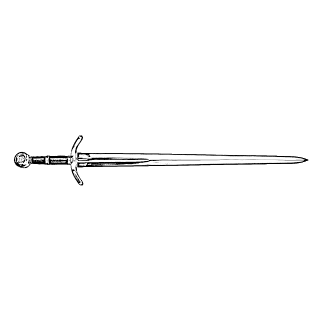
Kindar's sword is more than a piece of metal to her. It's a piece of her identity. It was crucial to me to have her sword represented in the novel, and Divertir is willing to go the extra mile to make their authors happy. I wanted a pencil sketch and that's exactly what they gave me. Now I'm nervous to hear your thoughts. Thumbs up or down?

Published on March 12, 2013 14:30

